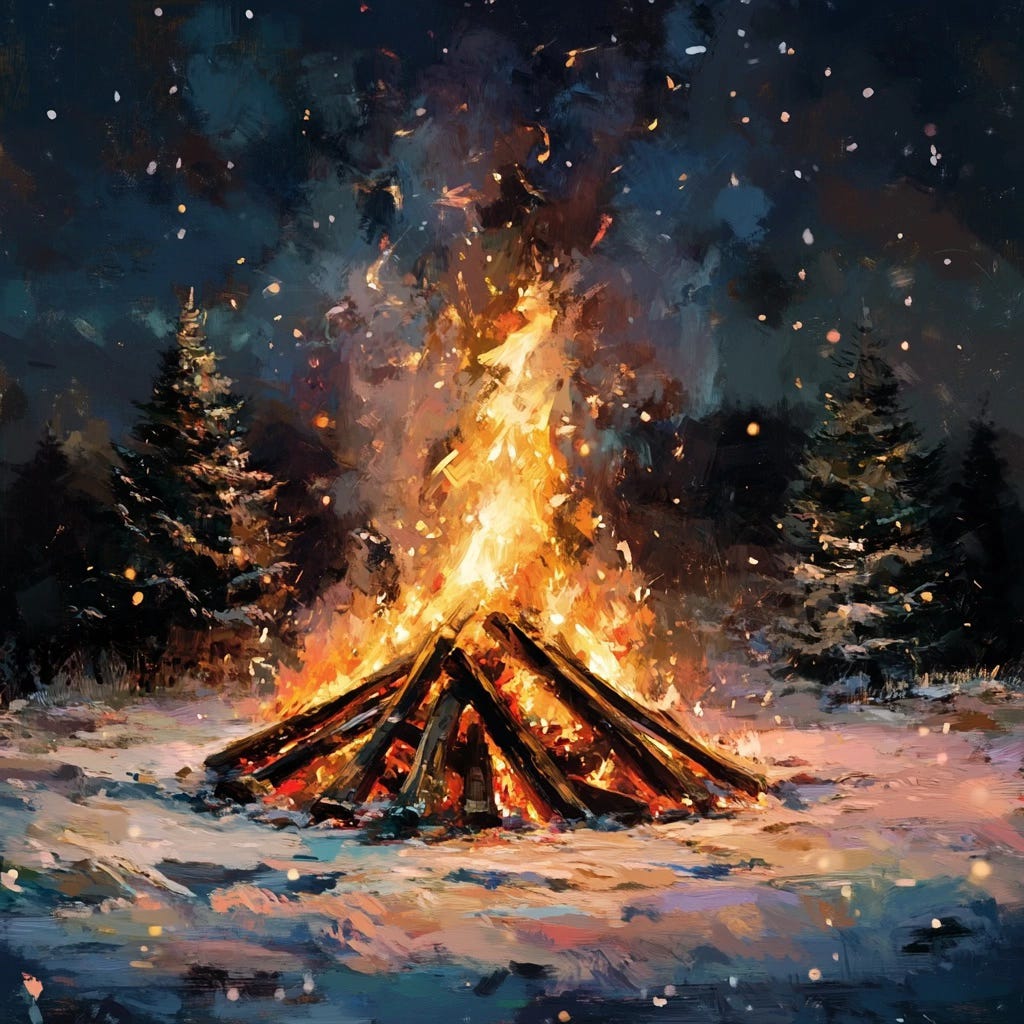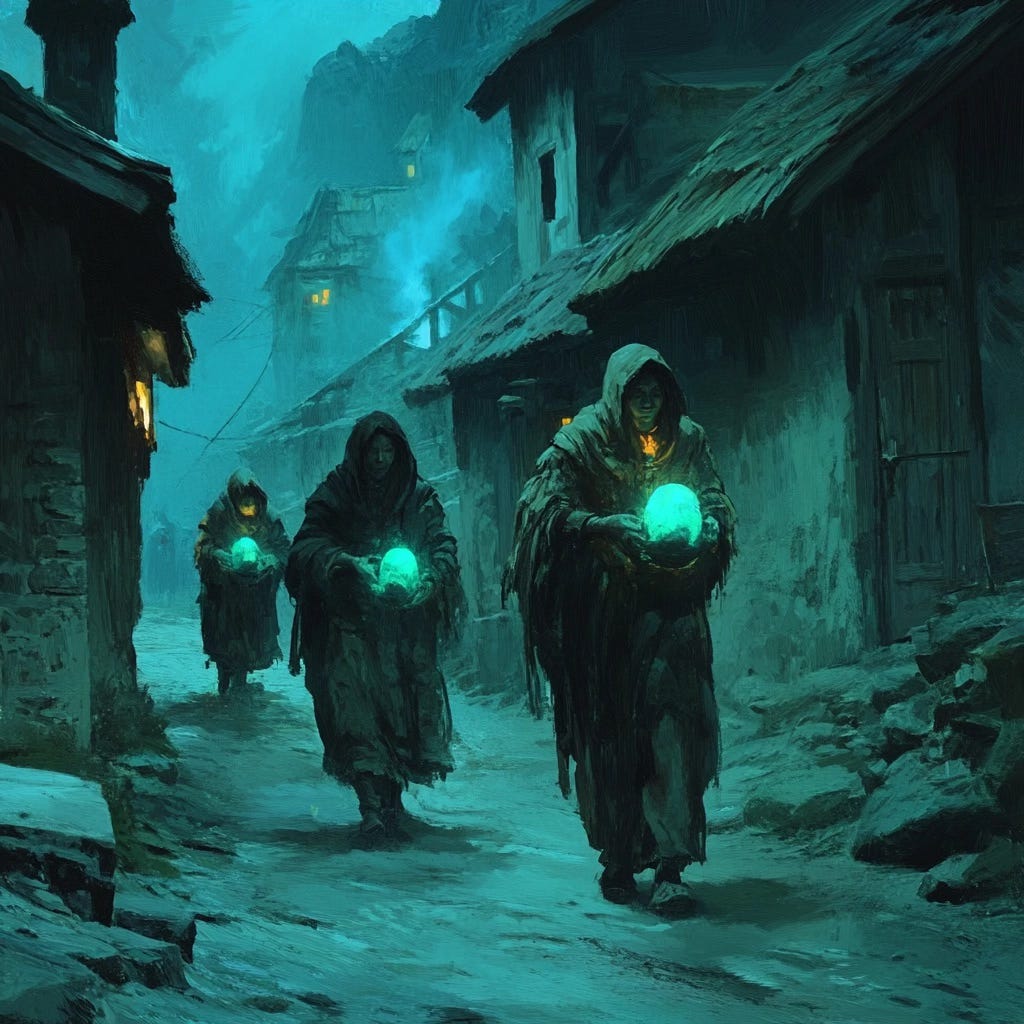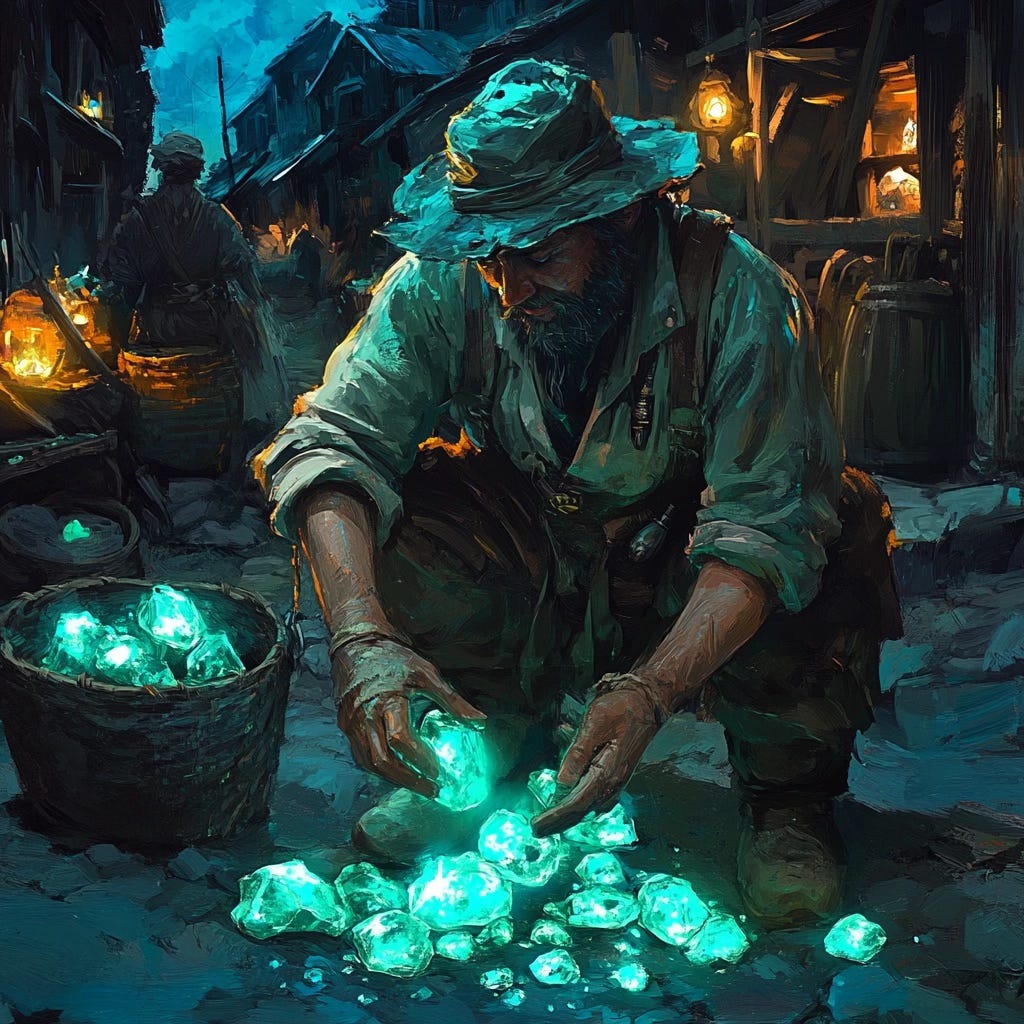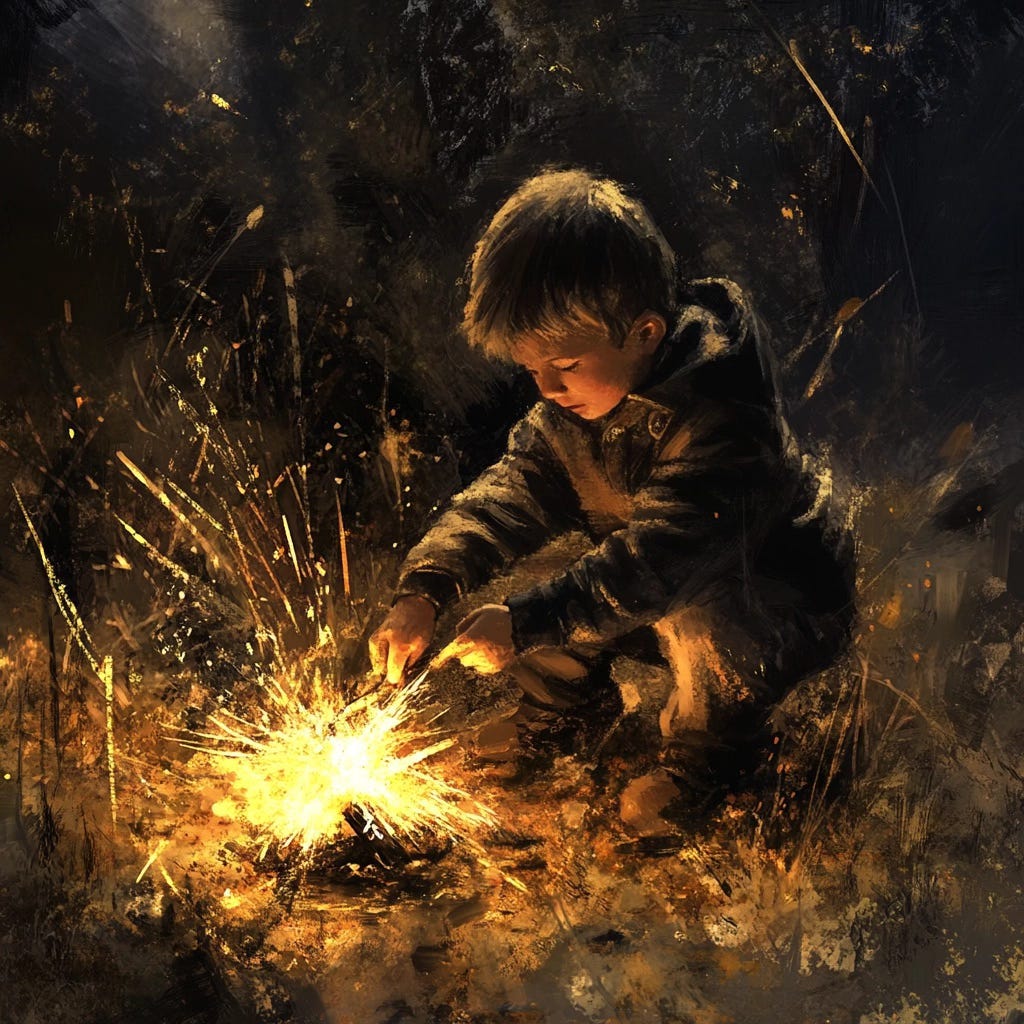Festival of Light, a Fairytale for the Darkest Days of Winter
Merry Christmas, I hope you enjoy this little story gift.
It’s almost Christmas. I’m a writer. So this year I have written a story for you. This is my present to the world. Take it. Please. I’ll see you in the new year!
Once upon a time, in a village nestled deep in the hills where the mist settled in the forest like smoke, there was a legend. The story went that on the darkest day of winter, it was the light of fire that kept the hungry ghosts at bay and reminded the sun to return in the morning. So every year it became the tradition to light candles and have bonfires until the day of greatest darkness passed.
These were great celebrations and much beloved by the townsfolks. Yet as the years passed the sun always returned, even when candles would fail and many bonfires dwindled to a handful. Villagers grew skeptical of such tales and scoffed at their ancestor’s sentimental foolishness.
Celebrations became even smaller. Townsfolk chose to busy themselves with entertainments, though they continued the tradition out of nostalgia.
Then one year miners discovered a strange stone deep underground. When brought out by day the rock would capture the light of the sun and glow on in the darkness for many hours.
While this light seemed bright enough for the villagers to keep up most tasks well into the evening, it was as cold as the deep earth it came from, no matter how long it was left to collect the sun.
The villagers loved this. They would cluck, “Here here, the stone light is better than the fire. No home has ever burned from its touch and no finger ever blistered from the stone’s caress.
Everyone wanted a stone, and they would carry them around with them everywhere. The people would say they even needed to have them as they did their chores outside. They said that was the only way to get a stone to hold the maximum sun. Most would not admit they wanted to have stones on hand just in case they stepped into a shadow or a cloud passed over the sky.
As the miners dug and more people across the village had glowing stones, the villagers began to say some of the rocks were better than others. There was a group that said large stones were better because they could hold more light, and others that said stones without flaws were the best because they were brighter.
Many believed fresher stones were the best and could hold the most light.
As this went on, the son of a poor miner had made a discovery of his own.
Little Arden did not have one of the glowing stones. Even though his father dug many from the ground, he believed in the old ways. He sold all the stones to buy food and medicine for the Broken Warriors and Widows of the Vein who had fought and sacrificed to build the village.
Like the other children, Arden wanted a glowing stone. He felt left out not to have one. Though the bonfire celebrations for the long night were his favorite time of year, full of food, family, and the bright warmth of fire, he couldn’t stop thinking about the glowing rocks.
Arden knew his Dad to be kind and honorable, so he did not complain even when the other children teased him, but the season of darkness was upon them. The day of the long night was almost here and he was determined to get a light stone for himself.
Being a youngin, he wasn’t allowed to go deep in the ground where the danger of bad air and rock falls made new Widows and Broken Warriors every year. So he looked at all the outcroppings speckling the hills.
Arden’s father had taught him to spot soft soapstone for carving, slate for sturdy roofing, and salt for preserving meat. He had learned on his own that soft yellow clumps found near the hot springs kept bugs away from his bed, and shiny dark rock could be ground into a reddish paint. The shiny dark rock was his favorite, and he kept one in his pocket for luck.
Arden also knew that sometimes white rocks had detailed spirals and fluted shapes that looked like curved butterfly wings. He loved to puzzle over these shapes, even though some said they were haunted. It was within the white rock that he found a lump of grey.
Arden pried it out to see if it held a novel shape, but it did not. Instead, it flaked as he worked at it and the razor-sharp edge it created cut his hand. Now angry, he threw the grey rock down hard. When it hit the ground bright sparks jumped out.
Forgetting his bleeding hand, Arden couldn’t believe his luck! He had found a stone that makes its own light, even if it only lasted a few seconds. Surely this was much better than the glowing stones that needed so much time in the sun.
Grabbing the grey rock, Arden raced back to the village to show everyone.
The boy was so excited he went at top speed the whole way. When he saw his neighbors he lifted up the rock to their faces to be sure they could get a good look. But what the villagers saw was the cut on his hand. They said this rock was too sharp. The glowing stones were rounded and safer.
When Arden pointed out they are easy to find at the surface of the earth, the villagers said something so easy to obtain lacks value.
Getting frustrated, Arden threw the rock down and a shower of sparks lit up the dusk. One of the sparks landed on a little girl burning her and scorching her dress. She ran to her mother in tears.
That was enough for the townspeople. Tomorrow would be the day of the longest darkness, and this year they would light the way with glowing stones. Everyone agreed that they were safer, brighter, and more beautiful than candles or bonfires which were now officially banned.
Arden was heartbroken. Not only did he not have a glowing stone, but he wouldn’t be allowed to have a bonfire or even light a candle on the day of darkness.
His family prepared for the festivities as usual, but without the bonfire to bake the traditional bread or the candles to mark the hours, no one was sure just what to do. Arden placed the grey rock in a small notch in the wall where traditionally the lit candle would sit. Then he looked to his father for guidance.
The towering man was troubled in a way his son had never seen before. When the collector came to take the family’s candles, his father had hidden them away. His mother, fearing the wrath of their neighbors while she had a new babe on the way turned them over with a look of sadness.
Arden asked him, “Father, what will we do without the firelight to hold back the long dark? What if the sun forgets to come back?”
The strong miner took his son in his arms and said, “We will do what we can. And we will do what we must if it comes to it.” Then he put the boy down and started arranging bags of rocks in the hearth and by the firepit where in years passed they built bonfires.
Most of the people were busy at sporting contests, games of chance, and other amusements as the sun set. They did not even watch as the last of the sun’s light plunged below the horizon.
At first, there was a great stillness.
In the distance, Arden’s family could hear the laughing of the gamblers. Apart from that, naught but the sound of the wind broke the night.
Then, as the last glow of daylight faded to dark, something changed.
Without the crackle of the bonfires filling the night air, Arden and his family could make out the sounds of a wail far in the distance. Perhaps a fight broke out amongst the gamers they thought.
A troubled look flashed across the face of Arden’s mother, then a look of mischief. From deep in the folds of her apron she produced two tapered candles, just enough to light their house through the long darkness.
Joyful, his father tried to spin her in his arms, but she brushed him off saying that there was no time, the first candle must be lit, and she must get to the ember before it burned fully out.
Though her large belly was surely a hindrance, she sprinted off to the kitchen.
With a sob, she returned with the unlit candle and a cold lump of ash.
As the family stood there in sadness and grief, the sounds of wailing became louder. The sounds that first came from a lone spot in the distance were now peeling out across the village.
Through the window Arden saw gaunt, hollow-eyed, and ravenous spirits following the townsfolk. The cold light of the glowing stones seemed to draw them closer.
Taken with surprise and recognition, Arden’s father said, “The hungry ghosts!” He jumped to his feet and cast about for a stick to rub into a flame. He found a small branch and kindling quickly, but in the dark, he couldn’t find the twine to make the stick spin fast enough to sprout fire.
A gust of wind shot underneath the door of their cottage. Loud wails and banging shook the house.
Then Arden remembered the grey rock that makes a light of its own! He grabbed the rock from the notch.
Unsure how to make it spark without throwing it to the ground, first he tried hitting it with a bit of wood. That knocked off some small pieces but didn’t make sparks.
The howls outside grew louder still as though they were just on the other side of the door. For a moment, Arden thought he recognized some of the voices.
Arden grabbed a large salt crystal his mother used for cooking. That broke off as much salt as it did the grey stone.
The wailing was so loud he could feel the waves of it in his body. His mother covered her ears, her face started to turn green. His father grabbed his great ax and planted himself in front of the door determined to protect his family.
Arden had one last thought. Perhaps the shiny dark rock, that makes red paint, would work. It was at least harder than the salt, and his lucky one was right in his pocket.
With the first crack, he drew sparks. With the second and third he had started a small shower right into the hearth. One of them took hold and the small mound of kindling began to smoke.
As it did, the wailing moved back from the front door. His mother came over quickly with a candle and dropped the wick into the tiny growing flame.
As the candle lit, the sounds pulled back from the door and the shaking stopped. Arden’s father put down his ax, and grabbed the sack of rocks he had placed by the hearth. The large man poured out dark black rocks into a grate. To Arden’s surprise, the rocks took fire when his father moved the kindling close.
Then the large man rammed one of the black rocks into the fork of a branched bit of wood, lit it, and headed out the front door.
“Stay here,” he told Arden and his mother. Carrying the burning branch, he strode outside and lit the sacks he’d put by the bonfire pit. The flames leaped high, driving back the shadows. The ghosts howled in retreat.
The family tended their fire through the long night. Some neighbors emerged from their homes, clutching hidden candles. Arden ran from house to house, helping light the wicks, filling their homes with warm flickering light.
The dark lasted longer than it should have, and Arden feared that the fires had come too late. Sometime in the midst of that Arden’s mother said that the new babe was on their way.
When it seemed like the black rocks were almost all burnt, Arden heard a new wail, but this one was different. It was the cry of a new baby.
As that tiny voice hit the air, Arden noticed the first streaks of light shooting across the sky and a warm glow growing at the horizon.
When he and his family ventured out in the morning, they saw what had become of the village. Those who had clung to their cold stones the most had been taken by the hungry ghosts. Gorged on food, wine, and each other, never sated, craving more until they perished, becoming hollow spirits themselves.
The others who had survived, the Broken Warriors and the Widows of the Vein, renewed their vow to hold the flame in the longest night.
Together they rebuilt the village. They marked the change by setting their clocks forward in the spring and back in the fall, as a reminder of the time lost in the darkest night. But from thence forward, everyone celebrated. The longest night was lit up with candles, bonfires, caroling, and festivities. Arden’s grey rock was celebrated and never again did the warm firelight go out.
Help Keep This Conversation Going!
Share this post on social media–it costs nothing but helps a lot.
Want more perks? Subscribe to get full access to the article archive.
Become a Paid Subscriber to get video and chatroom.
Support from readers like you keeps this project alive!
Diogenes in Exile is reader-supported. If you find value in this work, please consider becoming a pledging/paid subscriber, donating to my GiveSendgo, or buying Thought Criminal merch. I’m putting everything on the line to bring this to you because I think it is just that important, but if you can, I need your help to keep this mission alive.
Already a Premium subscriber? Share your thoughts in the chat room.
About
Diogenes in Exile began after I returned to grad school to pursue a Clinical Mental Health Counseling master’s degree at the University of Tennessee. What I encountered, however, was a program deeply entrenched in Critical Theories ideology. During my time there, I experienced significant resistance, particularly for my Buddhist practice, which was labeled as invalidating to other identities. After careful reflection, I chose to leave the program, believing the curriculum being taught would ultimately harm clients and lead to unethical practices in the field.
Since then, I’ve dedicated myself to investigating, writing, and speaking out about the troubling direction of psychology, higher education, and other institutions that seem to have lost their way. When I’m not working on these issues, you’ll find me in the garden, creating art, walking my dog, or guiding my kids toward adulthood.
You can also find my work at Minding the Campus









Thank you so much! Thats a great story!